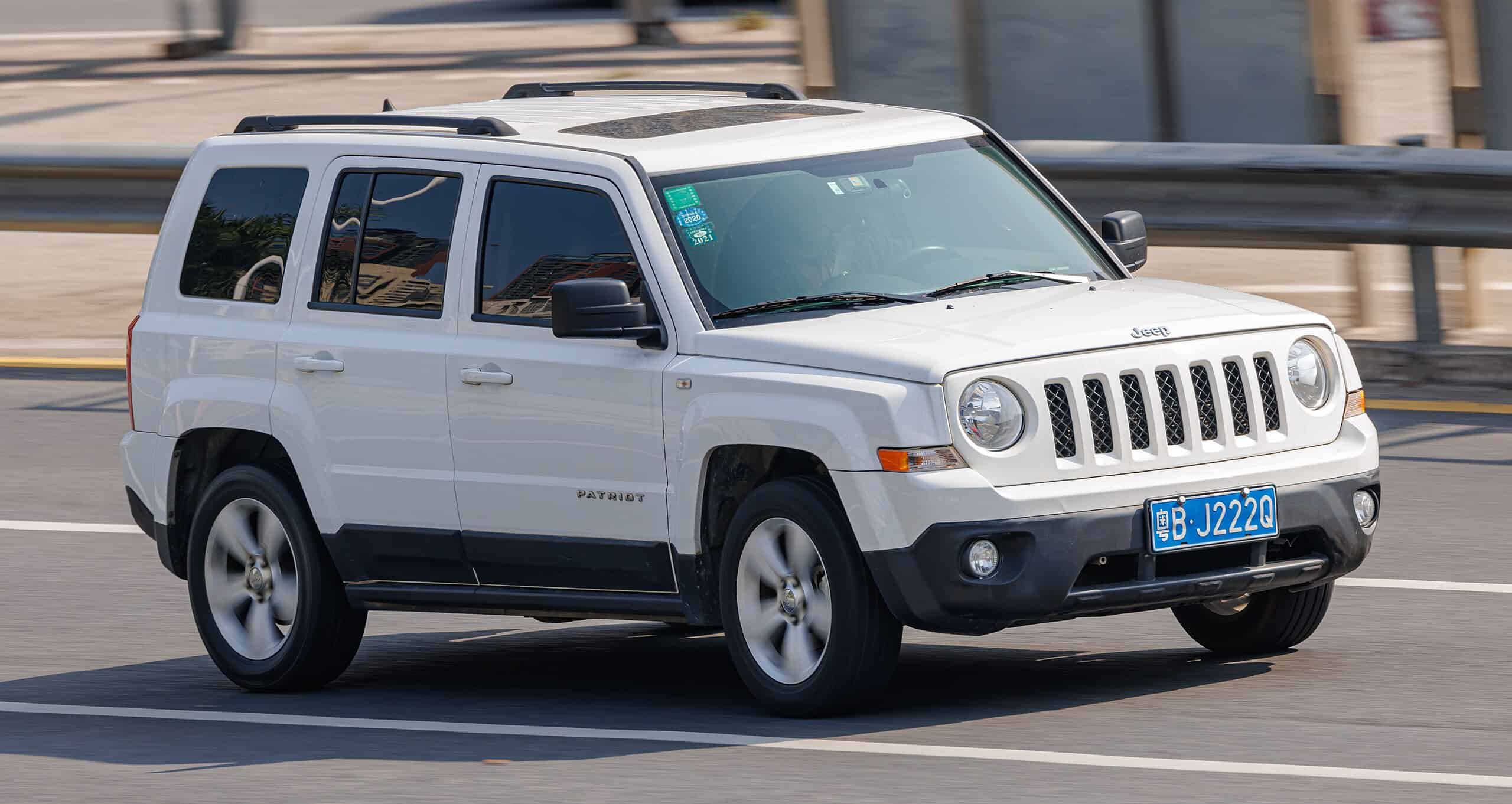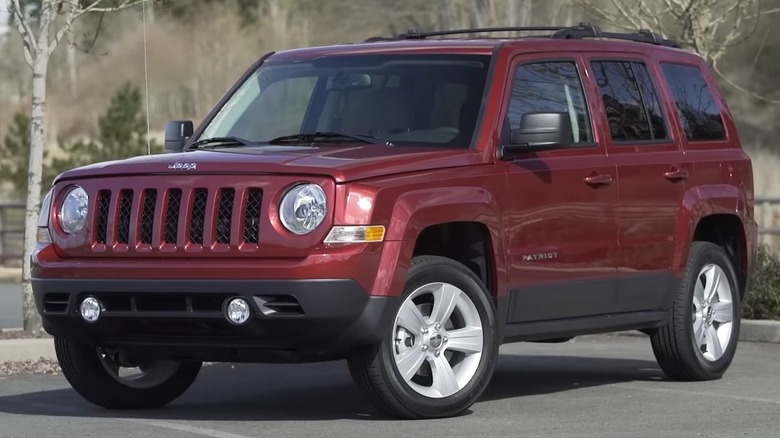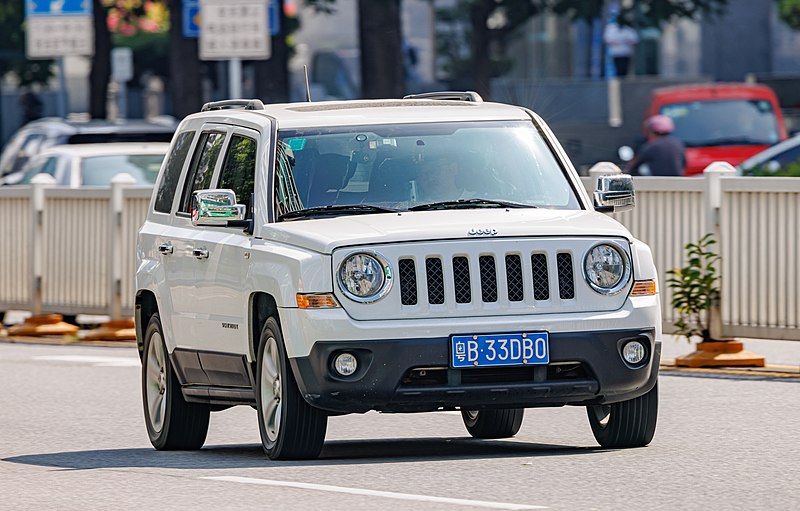When you’re shopping for a Jeep Patriot, you want to make sure you’re getting a dependable ride, not a headache on wheels. But here’s the thing: not all years of the Jeep Patriot are created equal.
Some models have a reputation for costly repairs, frustrating breakdowns, and features that just don’t hold up over time. If you’re not careful, you could end up regretting your purchase. This guide is here to help you avoid those pitfalls.
By the time you finish reading, you’ll know exactly which Jeep Patriot years to steer clear of and why. Ready to protect your wallet and your peace of mind? Let’s dive in.

Credit: 247wallst.com
Common Issues With Jeep Patriot
The Jeep Patriot has gained a reputation as a budget-friendly SUV with off-road capabilities. However, not all model years are created equal. Some have recurring issues that could turn your adventure into a headache. Let’s dive into the most common problems you should know about before buying.
Transmission Problems
One of the most frequently reported issues with the Jeep Patriot is its transmission. Owners often complain about the continuously variable transmission (CVT) failing prematurely. Symptoms like shuddering, overheating, or complete failure can lead to costly repairs.
Drivers have also mentioned difficulty shifting gears in certain models. This can make daily driving frustrating and unsafe. If you’re considering a Patriot, it’s worth investigating whether the model year you’re eyeing has a history of transmission trouble.
Engine Performance Challenges
Some Jeep Patriot models are notorious for engine-related issues. Many owners have experienced stalling or poor acceleration, especially in older models. These problems can be particularly concerning during highway driving or in stop-and-go traffic.
Reports of excessive oil consumption are also common. This not only affects your wallet but also puts additional wear and tear on the engine. Have you checked if the year you’re interested in has a track record of engine complaints?
Electrical System Faults
The electrical system in the Jeep Patriot is another area prone to problems. Owners have reported issues with the TIPM (Totally Integrated Power Module), which can cause malfunctions in the lights, wipers, and even the fuel pump.
Dashboard warning lights that won’t turn off and faulty power locks are also frequent concerns. These might seem minor at first, but over time, they can become both irritating and expensive to fix. Would you want to spend your weekends at a repair shop instead of enjoying the road?
Understanding these common issues can save you time, money, and stress. If you’re set on purchasing a Jeep Patriot, it’s crucial to do your homework and possibly consult a mechanic. Are you willing to take the risk with a problematic model year, or would you rather go for a more reliable option?

Credit: www.slashgear.com
Years Known For Frequent Problems
The Jeep Patriot is known for its affordability and rugged design. Yet, some model years experienced recurring issues, affecting reliability and performance. Identifying these problematic years helps potential buyers avoid costly repairs.
2008 Model Concerns
The 2008 Jeep Patriot faced major transmission issues reported by owners. Many experienced jerky shifting and early transmission failures. Complaints also included water leaks causing interior damage and electrical problems. Poor build quality led to frequent maintenance needs and dissatisfaction.
2011 Model Troubles
The 2011 model suffered from engine stalling and overheating problems. Faulty CVT transmissions caused frustration among drivers. Suspension components wore out prematurely, leading to a rough driving experience. These issues made the 2011 Patriot less reliable than expected.
2015 Model Reliability Issues
Reliability concerns plagued the 2015 Jeep Patriot, especially with the transmission system. Owners reported sudden transmission failure, requiring costly replacements. Electrical glitches affected essential functions like power windows and lights. The overall durability of the 2015 model disappointed many users.
Key Factors Behind Problematic Years
The Jeep Patriot has earned a reputation for affordability and versatility. Yet, not all model years have lived up to expectations. Some years faced significant issues that frustrated owners. Understanding the key factors behind these problematic years can help avoid costly mistakes. Below, we dive into the primary reasons why certain Jeep Patriot years stand out for the wrong reasons.
Manufacturing Defects
Some Jeep Patriot years suffered from poor manufacturing processes. These defects led to issues like water leaks in the cabin and poor sealing around doors. Faulty assembly also caused suspension problems that impacted driving stability. Such defects created long-term headaches for many owners.
Component Quality Issues
Certain model years were plagued by low-quality components. The transmission system, in particular, had frequent failures. Many owners reported overheating in CVT transmissions, leading to costly repairs. Electrical components like wiring and sensors also failed prematurely in some models.
Recurring Recall Patterns
Jeep Patriots from specific years faced multiple recalls. Issues ranged from airbag deployment failures to brake system malfunctions. Recalls often highlighted the same problems across multiple vehicles. This made these years especially troublesome for buyers seeking reliability.
Signs Of Potential Issues In Used Models
Buying a used Jeep Patriot can be a smart move for budget-conscious buyers. Still, older models may come with hidden issues. Spotting these problems early can save time and money. Here are signs to watch for when inspecting a used Jeep Patriot.
Unusual Noises During Driving
Strange noises might indicate underlying mechanical issues. Listen for clunking sounds when turning or braking. Squealing noises could suggest worn-out brakes or belts. Grinding sounds may point to transmission problems. Always test drive to identify these signs.
Frequent Warning Lights
Dashboard warning lights that stay on can signal electrical issues. A persistent check engine light might mean engine trouble. ABS or airbag lights could reflect safety system faults. Ensure the seller addresses these problems before purchasing.
Worn-out Interior And Exterior Features
Inspect the interior for ripped seats or damaged buttons. Fading or peeling paint may signal neglect. Rust around the undercarriage or doors can lead to bigger problems. Check headlights, taillights, and mirrors for cracks or wear. These signs may point to a poorly maintained vehicle.
Tips For Buying A Reliable Jeep Patriot
Buying a reliable Jeep Patriot can be a rewarding experience if you take the right steps. While the Patriot is known for being an affordable SUV, not all model years are created equal. To avoid costly mistakes, focus on researching, inspecting, and selecting a vehicle that meets your reliability needs.
Researching Vehicle History
Knowing the history of the Jeep Patriot you’re considering is crucial. Look up its Vehicle Identification Number (VIN) to access detailed records, including past accidents, maintenance history, and recalls. Websites like Carfax or AutoCheck can give you a clear picture of what the vehicle has been through.
Pay attention to mileage and ownership history. A Patriot with multiple owners in a short period might indicate recurring problems. Don’t rush—take your time comparing options and avoid any vehicle with red flags.
Prioritizing Certified Pre-owned Options
Certified Pre-Owned (CPO) Jeep Patriots often come with added benefits like warranties and thorough inspections. These vehicles usually have fewer miles and better maintenance records compared to standard used cars.
A CPO Jeep Patriot might cost more upfront, but the peace of mind it offers is worth it. A warranty can save you thousands in unexpected repairs, especially on older models prone to issues.
Would you rather pay a little more now or risk hefty repair bills later? If reliability is your goal, prioritize CPO options.
Getting A Professional Inspection
Even if the Patriot looks spotless, you should always invest in a professional inspection. Mechanics can detect hidden problems like transmission issues or worn-out suspension components that might not be obvious during a test drive.
Ask the mechanic to check for common issues specific to Jeep Patriots, like CVT transmission reliability or rust in certain areas. Spending a small fee on an inspection now can save you thousands in repairs later.
If the seller hesitates about an inspection, consider it a red flag. A reliable seller will always allow you to verify the vehicle’s condition.
Alternatives To The Jeep Patriot
When it comes to the Jeep Patriot, some years might not meet your expectations due to reliability issues or outdated features. If you’re considering alternatives, you’re not alone. Whether you’re looking for better performance, modern technology, or a more reliable ride, there are plenty of great options to explore.
Comparing Compact Suvs
If you’re drawn to the Jeep Patriot because of its compact SUV size, you’ll find many competitive options in the market. The Honda CR-V, for example, is known for its excellent reliability, roomy interior, and strong resale value. Toyota’s RAV4 is another standout, offering a mix of fuel efficiency, safety features, and off-road capability in certain trims.
For those who want a budget-friendly choice, the Subaru Forester could be a great fit. It comes with standard all-wheel drive and a reputation for longevity. Think about what matters most to you—cargo space, ride quality, or tech features—and compare models that prioritize those strengths.
Exploring Other Jeep Models
If you’re a fan of the Jeep brand, don’t worry—there are better options within the lineup. The Jeep Cherokee, for instance, offers a more refined driving experience and advanced safety features. Its Trailhawk trim is perfect for those who want off-road capability without sacrificing comfort.
The Jeep Compass is another option worth considering. While it’s slightly smaller than the Cherokee, it offers modern tech and a more stylish design compared to older Patriot models. Both these alternatives deliver the rugged appeal Jeep is known for but with fewer compromises.
Considering Newer Vehicle Options
If you’ve been eyeing a used Patriot, think about whether a newer vehicle might be worth the investment. Modern SUVs are packed with advanced safety features like adaptive cruise control and lane-keeping assist, which older models often lack. Plus, newer vehicles tend to offer better fuel efficiency, saving you money over time.
Take a look at brands like Mazda, Hyundai, and Kia, which have stepped up their game in recent years. The Mazda CX-5, for example, offers a premium feel without the luxury price tag, while Hyundai’s Tucson and Kia’s Sportage provide great warranties and cutting-edge tech. A little extra upfront cost could mean fewer headaches and more enjoyment down the road.
Have you thought about what you truly need in your next vehicle? Whether it’s reliability, performance, or modern features, exploring alternatives to the Jeep Patriot can help you find the perfect match for your lifestyle.
Maintenance Tips For Better Longevity
The Jeep Patriot is a reliable SUV, but like any vehicle, proper maintenance can improve its lifespan. For owners concerned about durability, consistent care is essential. Following good practices can help prevent common issues and keep your Jeep Patriot running smoothly.
Regular Service Intervals
Stick to the manufacturer’s recommended service schedule. Regular oil changes protect the engine from wear. Replace air filters to maintain efficient fuel consumption. Check tire pressure monthly to ensure balanced handling and avoid uneven wear. Keeping fluids like coolant, brake fluid, and transmission oil topped up prevents overheating and mechanical failure.
Routine inspections can catch small problems before they worsen. Inspect the battery, belts, and hoses during every service visit. Monitor brake pads and rotors to avoid costly repairs later. Scheduling timely maintenance saves money and extends the vehicle’s lifespan.
Addressing Issues Early
Don’t ignore warning lights or unusual noises. These are early signs of trouble. Fixing minor problems prevents them from becoming expensive repairs. For example, a small engine knock could lead to serious damage if untreated.
Inspect common trouble areas like the suspension and transmission. Address rust spots on the body or undercarriage promptly. Replacing worn components early reduces stress on other parts. Acting quickly minimizes downtime and ensures smoother performance.
Upgrading Problematic Components
Some Jeep Patriot models have known issues with certain parts. Consider upgrading these components for better reliability. For example, replace weak CVT transmissions with sturdier options if needed. Swap stock suspension parts for more durable aftermarket alternatives.
Invest in quality tires for improved traction and longer life. Upgrade headlights for better visibility during night driving. Enhancing weak factory components boosts safety and reduces frequent repairs.

Credit: www.copilotsearch.com
Frequently Asked Questions
What Are The Worst Jeep Patriot Years To Avoid?
2008 and 2009 models had major transmission and engine issues. They also faced reliability concerns and frequent repairs.
Why Is The 2008 Jeep Patriot Considered Unreliable?
The 2008 model had widespread transmission failures, engine stalling problems, and poor suspension durability.
Do Older Jeep Patriot Models Have Safety Concerns?
Yes, earlier models had lower crash test ratings and fewer advanced safety features compared to newer ones.
Are Jeep Patriots Expensive To Repair?
Certain models, especially older ones, often require costly repairs for transmission, engine, and suspension problems.
Which Jeep Patriot Models Are More Reliable?
The 2014 and later models are generally more reliable due to improved transmissions and better build quality.
Conclusion
Choosing the right Jeep Patriot can save you money and stress. Some model years had more issues, so research carefully before buying. Focus on reliability, maintenance history, and owner reviews. Avoid problematic years to reduce repair costs and frustration. A little caution now can prevent bigger headaches later.
Always inspect the vehicle and consult a trusted mechanic. Taking these steps ensures a smoother ownership experience. Make an informed choice and enjoy your Jeep Patriot with confidence.

















